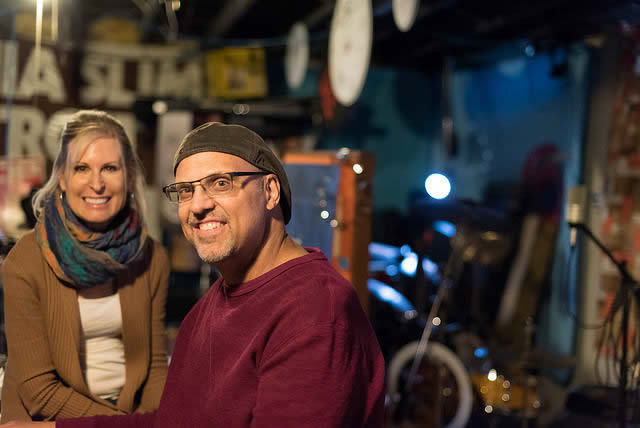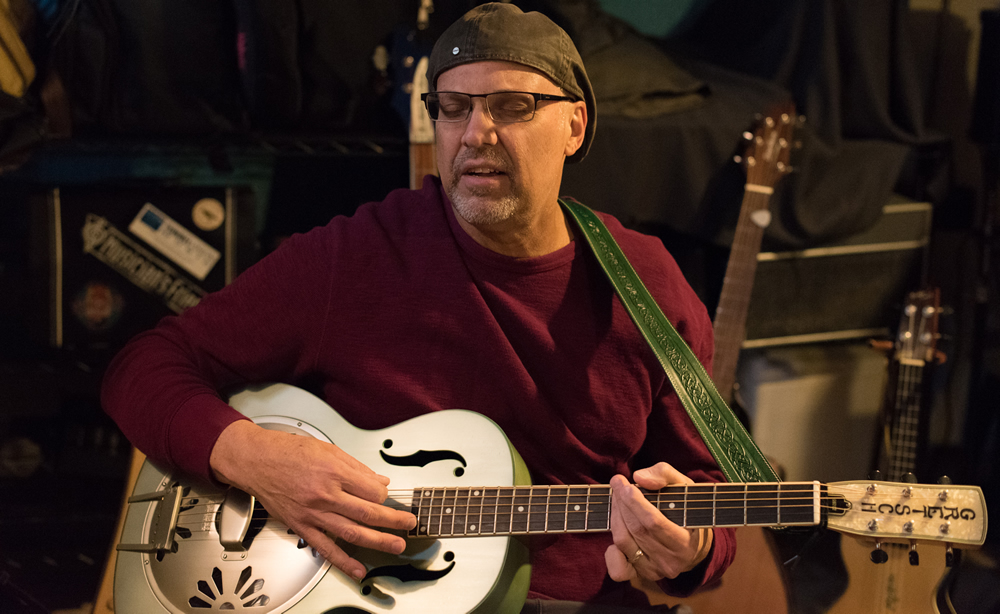Beautiful Music

Lavens calls Kathy his biggest fan and source of support during treatment.
Entertainment and emotions combine into therapy for cancer patients
Immunotherapy is a newer form of treatment that attacks cancer by boosting the body's own immune system and ability to fight it. Clint Lavens comes to the Rogel Cancer Center every three weeks for infusion treatments at a special clinical area devoted to evaluating new cancer therapies, the Ravitz Foundation Center for Translational Research.
Music has been a large part of Clint Lavens’ life, from when he learned to play the guitar at age 12, to his days performing in local rock and blues bands, to more recently when he took second place in the Detroit Blues Society Challenge. Now Lavens is using his lifelong passion to help him cope during cancer treatment.
Lavens, 59, was diagnosed with stage 4 bladder cancer in February 2015 after experiencing urinary issues. He received chemotherapy and surgery, and then joined an immunotherapy clinical trial led by David C. Smith, M.D., at the University of Michigan Rogel Cancer Center.
Peter Carpenter, a music therapy fellow at the Rogel Cancer Center, visited Lavens during one of his first infusion appointments. From group workshops to individual sessions, Carpenter uses music in a variety of ways to ease the stress of cancer treatment for patients and families.
"For outpatients like Clint, music therapy can normalize the environment and reduce the anxiety of not knowing what to expect," says Carpenter.
You don’t have to be a musician or even a music lover to experience the benefits of musical intervention. Music therapy can help patients:
- Promote relaxation
- Express thoughts and feelings
- Improve quality of life
- Enhance memory
- Induce sleep
- Lift mood
- Manage pain
- Reduce anxiety and depression

Who are music therapists?
Board certified music therapists have a bachelor's degree or higher, attend a college approved by the American Music Therapy Association and train for 1,200 hours with patients and health care professionals. Music therapists are also accomplished musicians, often trained in guitar, piano, percussion or singing. Using the combination of musical talent and education, they enhance cancer treatment to help meet the physical,emotional, cognitive and social needs of an individual.
Lavens is the first patient Carpenter can remember who brings different instruments to his infusion appointments and even began writing original songs about his experience. He recognized that, for Lavens, writing, performing and finding places to perform music is an effective coping mechanism.
Over the past several months, their sessions have shifted from Carpenter playing songs for Lavens to a true musical exchange. Sometimes, they'll play together for other patients to create a soothing environment.
Being entertaining and aesthetically pleasing are byproducts of what music therapy aims to accomplish, which is to help patients reduce anxiety, worry and perceptions of pain. Controlled research studies show that patients having music therapy have improved immune system functioning.
"Peter and I hit it off right away. He was a really easy guy to talk to. We had a lot to talk about because we both love music," Lavens says. "During cancer it has been therapeutic to write songs. At first I didn't write anything specifically about cancer, but now I've written five about my experience."
Music has also been a welcome distraction for Lavens' wife, Kathy Shaw, who comes to all of his appointments. Dealing with cancer can be equally stressful for caregivers. Since Shaw is accustomed to Lavens playing music at their home studio and attends most of his performances as a band member or soloist, music therapy feels like a natural fit.
"Kathy is so concerned about me," Lavens says. "She is also my No. 1 fan as a musician."
One of his newer songs, "One Strong Woman," is dedicated to Shaw, who helped Lavens through an especially difficult time after complications from surgery. She provides physical and emotional support, especially at home where she assists with changing dressings on his back where tubes go to his kidneys.
Lavens hopes to participate in this year's Detroit Blues Society Challenge, where he has taken second place in their solo category for the past two years. He'd love to win; the first place performer gets to go to Memphis to perform in a large blues festival.
"I've been playing music for decades, but it has been very helpful in dealing with cancer. I really like listening, performing but mostly composing," Lavens adds.
He and Carpenter are also talking about recording a song together.
Read the Spring, 2017 issue of Thrive.
